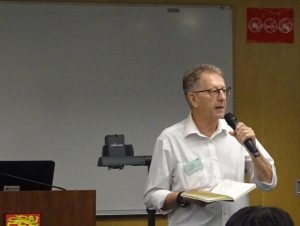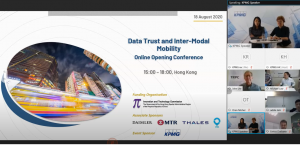

Inter-Modal Transport Data-Sharing Programme for Hong Kong
In a world dominated by data the issue of data sharing has come to the forefront of digital services, especially in areas such as trade, banking and finance and public services. Data pre-exists the digital age, but digital allows data sets to be shared, merged, anonymised, encrypted, and analysed so long as common standards are used and data sets are made machine-readable. But a prior issue is what incentives do organisations have to share their data, especially those providing public services but on a private basis where their data may be seen as their intellectual property, of commercial value and an asset that gives them a competitive edge.
Hong Kong’s Private Transport Dilemma
This dilemma was raised by the Chief Executive of Hong Kong SAR back in January 2017[1] when in a public address she mentioned the difficulty of government obtaining data from the bus companies, all of which are privately-run, for the purpose of transport planning. This gave rise to the idea behind the current programme proposed by myself at the Technology Research Project (TRP) in conjunction with four colleagues, Dr Jenny Wan, Terence Graham, Andrew Pickford and Waltraut Ritter (the HK Team) in collaboration with Dr Zhou Jiang-ping of the Department of Urban Planning and Design at the Hong Kong University (HKU) – the Inter-Modal Transport Data-Sharing Programme.[2] With 7-month’s funding from the government’s Innovation & Technology Fund (ITF) the programme started July 2020.
Proof of Concept through Data-Sharing
At the core of the programme is a Proof-of-Concept (POC) around the Exchange Square Public Transport Interchange (PTI) in the Central business district of Hong Kong served by two bus companies, a metro operator, a payments card operator, and the major property developer of the area. Each agreed to enter an MOU for data sharing on a strictly confidential basis with a Data Trust set up at HKU under the direction of Dr Zhou. Motivating the operators is a three-fold appreciation of the possible operational efficiencies that can result from the data analytics, an understanding that smart city development will increasingly involve data-sharing between the public and private sectors for the general welfare of society, and the need for greater policy and regulatory flexibility to take into account both new technologies, for example policies to encourage a shift to clean power and regulations to facilitate new services.


Exchange Square was chosen because it is a microcosm of Hong Kong’s transport nexus, with nearby services available from trams, ferries, taxis and mini-buses. If it becomes possible to add data from these modes of transport, along with walkability and cycling, then the POC will be enriched. If the POC is successful, data analytics will be used to test a series of use cases for passengers making trips involving multiple modes of transport using different mobility-as-a-service scenarios, such as single tickets for multi-bookings, pre-planned journeys, different entry and exist points around the PTI, better information systems, ways to reduce air pollution and improve the environment of the PTI, etc. The benefits should include improved passenger experience, less congestion and pollution, greater operational efficiencies, improved ability by government to plan, and perhaps most important of all, a template for other data-sharing POCs elsewhere in Hong Kong leading to pilots projects.
The Open Collaborative Research Principle


Next Steps
The Data Trust started operations in October 2020. A programme Draft Report is scheduled for the end of December 2020, and a Final Report by the end of January 2021. The timeframe is short and the research therefore needs to be highly focused on evidence-based policy issues.
For further enquires, please contact Dr Jenny Wan at [email protected] Online involvement in any of the Interest Groups is encouraged.
[1] “Our public transport operators, for example, are private companies. And they are generally reluctant to share, at no cost, data generated from their operations… We will continue our efforts to convince them of the benefits that everyone gains in a system where the data is freely available” South China Morning Post 8th February 2018
[2] https://trpc.accesspartnership.com/trp/data-sharing-program/
[3] “GECKO (Governance principles and methods enabling decisions makers to manage and regulate the changing mobility systems) is to support authorities in developing the most appropriate regulatory framework and governance model, through guidance, recommendations and case studies, for the transition to a new mobility era of cooperative, inclusive, competitive, sustainable and interconnected mobility across all modes, through evidence-based research.” https://h2020-gecko.eu/about